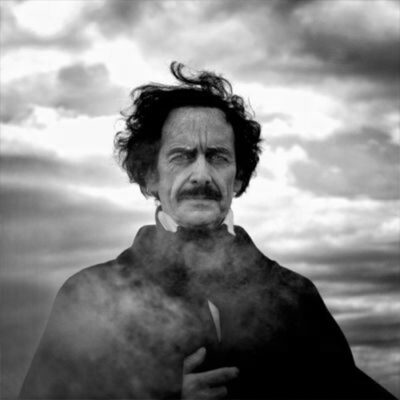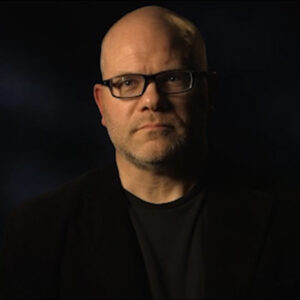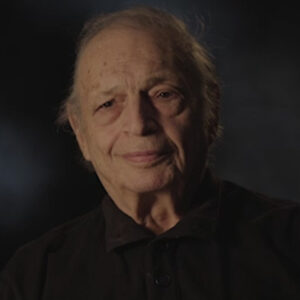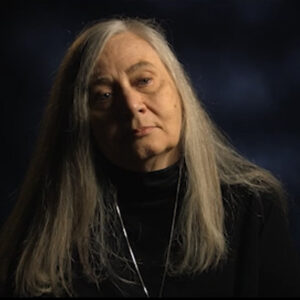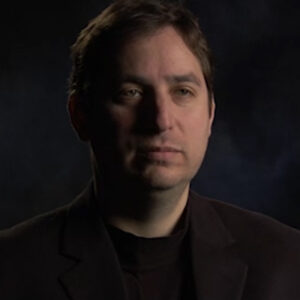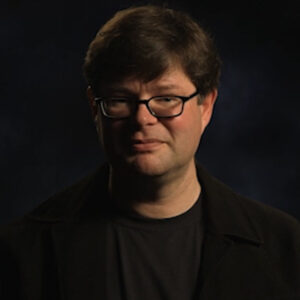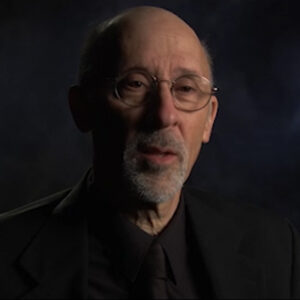Speaker Well, let’s start with the the child, because our film proceeds chronologically, so we need to keep the answers more or less contained in the period, I suppose, life.
Speaker So if we could start with the young poet. What do you think the impact of his parents death, of his orphanhood was on him, how did that shape him and what what would you have imagined that child would have been like as he’s growing up in the Allen household?
Speaker You want to start with Allen rather than going back to the parents? Because I think, you know, the dead mother, the drunken father, the theatrical background. Do you mind if we go back? And that was your first question. You didn’t want to know. I crossed out about four, but not that one.
Speaker OK, fine. So so talk about his parents, both both parents.
Speaker Well, I think the attitude toward actors was very split. On one hand, as today, they’re glamorous figures. You know, they appear on stage and have dramatic lives. And also in those days when they didn’t have repertory theaters, they traveled around up and down the East Coast. On the other hand, they had a reputation for low morality and that the women were supposed to be, you know, next door to prostitutes. And in those case, his mother was married to his father, who was also an actor. But the father was an alcoholic and the mother died and opposed to how much the poor remember when he was two years old of his mother. It was not so much she remembered the mother, but that there was an absence of a mother who then played into all the other deaths that followed on the three other important women died early on.
Speaker And so the other question was the.
Speaker Inherited alcoholism from his father, which was strong, and also the fact that he was fed gin by his nursemaid when he was an infant, but I think from the mother came this histrionic aspect of which is very, very strong. And you get it in the whole melodramatic sequences in his stories, you get it in his life, which seems like an opera being played out on the stage. It doesn’t seem like anybody’s real life. And when you read what he said to the women he was courting after his wife died, it seems just so over-the-top. And you couldn’t imagine that anybody could accept it. But the fact is, they loved it. And I didn’t realize I was middle aged. How well Flanary worked on women, the more you pour it on, the more they love it. And whenever anybody ever fired me, I always considered it insincere and fake and didn’t pay any attention to it. But women lap it up and Poe is really great at that, including falling on his knees and hand over the heart and for lock down and heavy breathing and all kinds of promises. So I think that’s very important that he gets the theatrical aspect of his life and his behavior. And the only thing he ever succeeded at really was lecturing. And he was tremendous at that. And when he read The Raven, women would kind of swoon as they do. If you go to a poetry reading today and you look at the young girls in the first row and some half assed poet comes out to read and they’re all wide eyed and, you know, they’re they’re this is tremendous sex appeal for somebody who’s a poet and somebody who’s reading in public. And Poe really made the most of that. And so far as he could capture his audience, he lower the lights, the curtains would be drawn. There’d be these black shadows. And he was terrific at it. Also, he had a very cultivated Southern gentleman accent, and that went over well in places like New York and Boston, you know, in New England, away from the south. So that’s important. Very important, I think.
Speaker And when he said when he was a child in the Allen household in Richmond, he’d been taken in by the foster family. But they’re not. It’s somewhat conditional. How do you think he suffered from being the child of actors, being known as the child of that effect?
Speaker Alan didn’t have any social standing except insofar as it was created by his money. He’s born in Scotland. He’s a self-made man, pulled himself up by the bird sprats, and he wanted to be the same. In fact, he put Poe in the counting house, which was not the place for Poe. And Poe obviously rebelled. But Allen was a good father at first, or at least his wife was Frances Allen, who was really a terrific mother. They didn’t have children. That’s why they adopted Poe. They wanted a child. They had the son who was a likely lad. You know, he was bright and he was lively. And he was I guess that was attractive as any other kid before the father had started bulging out over the top of his head, like Alan Tate. If you’ve ever seen on Tate, you probably did see him. He had that same polite forehead. It was very weird. But also people said, well, he has a well developed brain. You know, his cranium is bulging out and so on.
Speaker So at first it was great and then their ambitions diverged strongly. Alan wants them to take over the business as any successful business father wants his only son to do and said that’s not for me, had stories, stirrings of poetry. So they send him to the gentlemen’s university in Virginia, founded by Thomas Jefferson not that long ago. And Poe excelled academically and he studied Latin and Greek and foreign languages, French and German. But it was a wild place. And even now it has a reputation for, as you know recently, rape and drinking. I don’t think there are any women there in those days, of course. So Paul gets in with drinking and gambling crowd and he’s, you know, he’s he’s an unstable guy, mentally very highly neurotic and easily persuaded by people who are drawing them the wrong way. So he drinks a lot and he gambles a lot. And he was not a good gambler and he lost a lot of money and that he couldn’t pay his debts. And then he appeals to Alan. And Alan says, why the hell should I pay your gambling debts? You know, I mean, why don’t you come back and do some decent work and earn a living? You know, the usual fatherly good advice that no one wants to take, so. He is not given enough money by Alan because he’s wasting so much money, he’s not living within his allowance and eventually he’s forced to leave the university. So that’s that’s the. Dead mother, the drunken father, and now the quarrel with the stepfather and then his stepmother, who really was a great mother to him and who loved him, she died and then she replaced by a second wife who then sees Poe as a rival, obviously, for the money. Who’s going to get Allen’s fortune, the second Mrs. Allen or Eddie Allen Poe. And so she kind of cuts him out of Allen’s life insofar as she can. And then after that, it’s really depressing. All Poe does is keep writing. He’s begging. He has this terrible ability to write a begging, threatening letter where the begging doesn’t work and the threatening doesn’t work. And he just looks like a an idiot, really, by pleading and threatening and threatening to kill himself. And and people see his name on the letter in the hey, look, you know, I don’t want to read this letter. I just throw it in the garbage. So I don’t know if he ever got money out of anybody by writing these really half assed, stupid, offensive, over-the-top emotional letters which were not designed especially by a writer, to elicit what the letter was meant to get the opposite effect. And in fact, almost everything Poe ever did in his whole life had the opposite effect of what he intended. Even though he’s a very smart guy and a very good writer, he just didn’t know how to live a successful life and never learned.
Speaker Good things keep coming to life there, but we can go back to sure, trying to get a sense of the adolescent pope and his self discovery as a anada step forward patroness kind of figure and how if we can put in a slightly wider context.
Speaker How he saw himself vis a vis John Allen, John Allen as the Krass looking to list the Jacksonians money grubbing self-made man who seems to have regarded himself at least as a younger self, as this pure more and more of an artist.
Speaker Could you just talk about that?
Speaker Yeah, well, he came out of a romantic tradition which was rebellious. You challenged conventional society and you were a kind of Byronic hero and rebel who even curse by Cain, diabolically possessed by dabbling in evil.
Speaker And this was fashionable, you know, just like today, other things are fashionable with the idea of what an artist is supposed to be like. So Paul came out of this romantic tradition and saw himself. He recognized, I think, that he did have genius and that he had at least potential to do something important and significant. And this absolutely clashed with what Allen wanted. And they just didn’t didn’t see eye to eye and never did and never could. And Allen punished him, I think, for not obeying, but also punished him because Poe needed punishment, because he was not a proper student at Virginia. He was ruining himself. And what could Allen do? He could say, you could you know, you better behave. But he just cut off the money supply, refused to pay the debts, made life impossible for Poe. And so you just have a clash of temperaments, ideals, ambitions, future Hope’s career, they just clash. They were to opposite. And Alan was not the sort of man who would say to Poe, well, Edgar, you know, you’re going to be a great poet someday. So why don’t I just give you a lot of money and let you go off and write poetry? That was not his way.
Speaker Great. Thank you. That was great, Jane Stannard, the one who called her his first ideal love or something.
Speaker What does she mean to him and what did this do?
Speaker I think she’s more of an idealized than a real figure. I mean, she well, I think Po’s attitude toward Jane Stannard was that she was an idealized woman as much as a real woman and that when she died, now she’s following the path of Mrs. Poe, his mother, and anticipating other deaths coming his way in his life. And so she became this figure, I think, that he could use in his life and in his works. I can’t imagine that he had a profound love relationship with Jane Stanard, but he made it into something which had emotional, romantic and literary potential that could be exploited in his works. And again, it has to do with the idea of the tragic poet in my heart is broken, you know, I’ll never love again. This is the woman of my life. And I’m not sure she was all that, but she was made into that by his imagination. And then that was followed by the death of Frances Allen.
Speaker And so at least I think Frances Allen followed Jane Stanton.
Speaker He’s just developing one of the great patterns of his life, the dead woman, which is one of the great themes of his life, ever, his work. And these dead women eventually come back to life and his stories, somehow they find their way out of a coffin. It’s very hard to understand how they do it if the coffin is nailed down and buried under dirt and so on. But but they seem to be ethereal spirits who sort of slide out of the coffin and through the dirt as a ghost might do the way a ghost enters a closed room and there they are back to life, as he always wanted these women to come back to life. Oh, if only my mother hadn’t died of shame. Standard hadn’t died. Frances Allen hadn’t died. If my young girl wife, Virginia Poe, hadn’t died, then, oh, God, you know, my life would have really been great. But it didn’t happen except in the stories which are compensatory and wildly thrilling and interesting and exciting and still are.
Speaker So he joins the army, I guess, on the run from creditors as much as anything, but what kind of soldier was he? Why do you think he joined the army? What kind of soldier was he?
Speaker Was that the army is always a refuge to people like people who didn’t know what they wanted to do, like sending the kid to military school. If he’s out of control as a teenager, you get a kind of regulated existence and a regular pay, even though it was very low. And he did well in the army. I mean, he went up to sergeant from Private fairly early on and the discipline was good for him. But at a certain point he realized that he had no future in the army. He couldn’t really go anywhere else beyond where he’d already gone. There was no point in staying there for another 20 years and doing nothing. And, you know, there was no question of military adventure. Is there anything that could show his bravery and boldness in battle? He was just doing garrison duty and drilling and, you know, paperwork because he was educated and it was boring. It wasn’t there was no interest and there was no future. And everybody probably in his life has had some job where he suddenly realized after he had it that I’m going nowhere with this thing. And so he had this another one of his ideas getting to West Point.
Speaker And whenever Paul wanted a reference, he went to somebody who he had quarreled with and who hated him, so he goes to these people to get them into West Point, somehow he does get into West Point, which probably wasn’t all that easy. And today it’s not easy and it wasn’t easy that it’s free and very strictly disciplined in a nice setting like Virginia on the Hudson River, a lot of prestige of being a cadet military career, which again, wasn’t really right for DPO and.
Speaker The only other major artist, sergeant, I guess, was in West Point, he said if helium had been a mineral, I would have been a general, something like that.
Speaker It’s a great quote. He failed his chemistry test and was kicked out. And the same thing went from how he was doing. Well, academically, he was always a good student.
Speaker But he got kicked out deliberately, not accidentally, he just broke all the rules, he didn’t turn up for drill, he didn’t turn up for class, he went to places he wasn’t supposed to go that in where students hung around. And he drank a lot, of course, and maybe even got into fistfights and did everything he wasn’t supposed to do. So you get a certain number of demerits and you’re out, which is what he wanted. He wanted out of there. He wanted out of the army. He did not want out of Virginia University.
Speaker He was forced out there. But we’re getting to the pattern of Poe is putting us putting a.
Speaker The wrench into his own wheel, to mix a metaphor, you know, he’s screwing himself up right away, so he.
Speaker I gave a lecture at the Citadel on parents in the south, and they all want to know why people got kicked out of out of West Point and how you get kicked out of West Point. This is what interested them more than anything else in Paul’s life.
Speaker It’s really fun telling them about those adventures and having them raise their eyes, say, boy, if we did that at the Citadel, you know, we’d be on air in five minutes anyway. That’s what happened at West Point. And another failure.
Speaker Thank you. How are you doing? Fine. That’s great. That’s very good. Getting through because you’re a biographer, I just need to go through the whole thing and.
Speaker So when one vote ends up in Baltimore after West Point moves in with these relatives whom we didn’t know very well, I mean, they were a little baby. He hadn’t spent a lot of time with them. But he finally finds a family. It’s as if he finally is accepted and has this this little bunch of people around him. Can you describe what that household would have been?
Speaker Now we’re talking about Maria, a Virginia little little Virginia, who’s then about 10 years old.
Speaker Well, it’s pretty is a pretty weird household. And yet in many, many ways it has one second.
Speaker Yeah, wait a second.
Speaker Bus or whatever. Was that a plane or what?
Speaker It’s a jack. You have was it?
Speaker Are you still here?
Speaker Oh, yeah, even when I was on the BBC and some not a real studio there is constantly had to stop and wait. This was in London.
Speaker I think we’re just a bit stuck. All right. Yeah. So start up again after the pole moves into the first real family he ever had to start one more time. I stole Yabaki.
Speaker Power moves into.
Speaker Relatives, his aunt, Maria Klam, and his cousin, first cousin Virginia, who 10 years old or something or 13, and she adores him and he educates her to be the wife of Edgar Allan Poe, to be the wife of a great poet. And she’s sweet and pretty and pale and sick and goody goody. And she doesn’t seem to have much of a personality except somebody who sort of lies in bed and coughs and Spitzer blood.
Speaker And I’m just going to interrupt you, because we have to keep this contained to that moment, not anticipating the marriage. Just to describe if you could just describe the household when I think that may have been one of the questions I crossed off.
Speaker And anyway. Well, I mean, what can you say you have the aunt and the cousin who’s a little girl and the aunt is a capable woman. I mean, she’s fighting poverty her whole life. One of the ways she fights poverty is to sell all the books and power bars from anybody leading to a lot of conflict, a fairly trivial. But yet when people go to the bookstore to see their own books that they want to power, they get annoyed. And he’s educating this little girl who who I guess she went to school, but you never really hear anything of her outside the household. She seems to be confined to the household in a domestic role, you know, helping her mother and being nice to Edgar and trying to calm a mad man down. And and and they loved him. And they recognized that he was an extraordinary person. And he saw in her as some kind of, you know, future potential. And there was no reason why he couldn’t marry his first cousin. And yet it was considered slightly irregular and odd and maybe not a good idea. People didn’t know about genetic problems, but and certainly royalty married their first cousins all the time, which led to all kinds of hemophilia and the Russians and Hapsburg jaws and that sort of thing. But I wouldn’t say there was universal disapproval when people, you know, became interested in her as a future wife. But he just you know, he found, I guess, the first happiness he’d had since Francis and Allen had done so. It was congenial. And there was a real three oddball people. You know, they didn’t seem to have much in common, but they were related and they loved Edgar.
Speaker That’s great.
Speaker That’s something anyway, for him.
Speaker And he’s trying to be a writer. He’s trying to sell his material. He’s what’s so that I’m talking about him now at the age of 22.
Speaker Twenty 23 before he’s got a Southern Literary Messenger job. What is he up against to be a writer and where they’re professional writers?
Speaker Well, he’s the first writer in American literature who tried to make it as a professional writer. The other writers all had either some kind of sinecure as councils in England or France or worked in a customs house or Longfellow as a professor at Harvard. And some of them are clergymen.
Speaker I think Emerson was a clergyman or else they had family money, in other words, that have something to fall back on. But Poe didn’t have anything. You just start with a piece of black paper. I did that myself when I left teaching in 92 and there was no salary anymore after 30 years. And you sat down at the desk of a piece of black paper and you had to turn that into enough money to live on time and doing for the last 22 years. So here’s the problems. Number one, there was no copyright, which meant that his works could be published in England without paying him. And English works by people like Dickens could be published in America without paying Dickens. So if he can publish Dickens for free, why should you pay Poe and other American writers money? The other thing is because he was always short of money. He never got royalties. He always sold whatever he wrote outright, which is always a bad thing for a writer to do even today, because you never know they can be reprinted. And John Bailey, my friend who just died, you know, he wrote his book called Iris and he signed away film rights. He told me to never dream that Iris would be turned into a movie. Well, John got no money for that. So you have to be very careful about what you sign away. Paul was never careful about anything. So he writes The Raven. He sells it for ten dollars. They make 100000 copies out of it. Everybody gets rich. And Poe is just as poor as he ever was. Or he works for magazines and he is a brilliant editor. And he brings the circulation up from very little to a very great number of copies. And he’s still making his crappy salary every week and working like mad. And the other guy, the boss, is sitting in the background smoking a cigar as the money comes in. And there’s already the hack of all time writing all this crap and reading all this crap and editing all this crap and putting out all this crap and working very, very hard and getting nothing from it. He wanted his own magazine. That was his great dream. And he never had he never got it. So all he did was do hackwork for other people who made money and he didn’t. So we’re talking about no copyright, selling your work outright, low pay editorial hackwork and just you just slave away. And unless you have some kind of cushion, which he never had, it can be very rough just sitting down saying, you know, what am I going to eat for dinner tonight? I better write something that’ll pay. And he has Maria Kleman and and Virginia to worry about as well. It’s really very rough. And he didn’t have the kind of calm temperament to sit down and say, well, you know, I want to just write this thing and then we’ll get some money and then we’ll carry on. We’ll have a nice, orderly life. And Maria will, you know, and it didn’t work that way. He took on this responsibility, which he never could. The other thing he wanted, of course, was a rich wife, which he didn’t have with his only wife. And then when he later on, we’ll get to that didn’t work.
Speaker That’s great this time of the Southern Literary Messenger. So this is his first job in the business. It’s his first real professional role.
Speaker What do you think you learned there? What identity as a as an editor and as a critic that he created for himself there?
Speaker I haven’t got too much to say about that.
Speaker He learned what the public wants, so he had to publish in that magazine what would sell as the same as today. You can’t just publish what you like. Even if you’re a highbrow magazine, you still have to cater to your highbrow clientele. If you’re political, you have to have the right political line and so on. And then he had to try to give his own work to what would sell. There’s no point in writing things that don’t sell. So I think just that he became professionally aware of the commercial market for sub literary and serious literary Polish literary work, and all his life, he’s kind of torn between writing what he wants to write.
Speaker And writing what the editors and the public want him to write and eventually, you know, he did once he got past his early work, I think he did find the formula of what people wanted and and amazingly still want today when they read Poe. If you sit down and read his best stories, they’re very readable and they they still really go over well. And they’re into the popular culture in a way that everybody has accepted. And he’s really an amazing genius. But on the other hand, he’s a miserably unhappy and unsuccessful man.
Speaker Going back to the southern border, I guess, in two days, do you remember that debate he had with white Thomas White, his boss, and over the story, Berenice, who wrote the story Veronese about the man and the teeth, dead wife’s teeth out. And then it turns out his wife isn’t dead after all.
Speaker I really don’t I don’t remember about that. But one thing I want to say about Berniece, one of the reasons that resonates today is you think of the extermination camps during World War two and when they took the corpses out of the crematorium, all the Jews and other people that they murdered, they then knocked the teeth out of those corpses in order to get the gold teeth because the teeth and the were the only things left. I think the bones that actually even melted into dust. So I can’t read Barony. So that thinking of the Nazi crematoria and that’s one of the now pope has nothing to do with that. But he’s on to something in the culture. This was tearing out the teeth. Whether the person is alive or dead is anybody’s ever had a tooth pulled nose is not much fun. And that’s what Poe is tapping into, you know, is kind of unconscious fears that everybody has deep into the culture. And I think it really does resonate from Bernie’s right down to the extermination camps. I didn’t say that in my book, but I’ve thought of it going over this in the last week. And I think it’s a very good example of how Poe is modern and anticipating horrors that didn’t exist in his time, but which he was partly consciously and partly unconsciously aware of, just as an aside.
Speaker So the debate was Thomas White was horrified by the story and he thought it was an extremely bad weather. It’s in bad taste or not is immaterial. The point is, will it sell? This will sell.
Speaker Yeah, well, Poe was I think they were both right. It is in bad taste, but for that very reason. I mean, Poe is often bad tasting piles and on and people people lap it up because I think he’s tapping into the fears that people have. And I can’t say any more that I’m frightened by reading a post story because I’ve been around too long and read too many stories, my power and other people. But when you first read the story.
Speaker They can be scary. Yes, you wouldn’t certainly want to read them to children at bedtime, that sort of thing.
Speaker What about as a critic, so he’s he’s covering his identity as a critic as well as an elder statesman. That’s what he earns the Tomahawk man.
Speaker Well, this is kind of amusing aspect of PO. I kind of like this. You can’t get away with it today. If you’re if you say the sort of things that Post said, basically, this is a piece of crap. The editors won’t let you publish that. You know, we’re terribly concerned about not offending anybody. We just want to be bland and boring. And the editors are terrified that somebody write a letter saying, I object to that as a as a feminist, as a black man, as a homosexual. I object to that. Everybody objects to everything. But in those days, the editors didn’t care about objections. They just thought you can throw the objections in the gas, in the garbage can. What we’re interested in is stirring people up and getting them to read the thing. And Poe is really great at that. And he would just say outrageous things. The Tomahawk was, of course, the Indian weapon buried in the scalp of your ad, discounting your enemy and buried in the head of your enemy. And he was really very good at that. I mean, when he saw a piece of garbage and there was plenty of it around, he would say this is a piece of garbage. You know, the man should be locked up. His pen should be taken away from him. You know, he should be kept away from all editors and black paper. And, you know, he should go back to sweeping streets if the only thing he’s ever good for, whenever he said not an an all time certain.
Speaker Riders have made their reputation on being severe. Randall Tyrrell is the one that comes to mind, but he wasn’t nearly as severe as polo because pose very ad hominem and you really have to stay away from that today.
Speaker But Darelle would say the poems seem to be written on a typewriter by a typewriter. I mean, that’s the sort of thing that really sticks in your mind and makes Jerrel feared as a critic. And Jerrel was right. And Poser YPO didn’t have to make these fine distinctions. You could smell the crap a mile away. But with Jerral, he was really sorting it out. You know, who is really good and who was not very good. So hpo, I mean, I liked that part of him and one I just as a sideline. But it’s interesting that I’ve known some famously severe critics, Jeffrey Grigson in England and Marvin Mudrick in America. And in fact when you meet them, they’re really rather nice guys. It’s only when they get the pen in hand they become quite vicious. And then you really want to read their stuff because they’re so good at attacking and I like to do it myself. But then editors say you’re too severe and there’s no point in reviewing this book. If it’s no good, you know, I’m got space. You have to concentrate on the good stuff and sometimes you have to hold back because the guy is reputable but never held back. That’s the thing. And I think this is a kind of admirable side of his character, although what does it get you? I mean, now you never heard of any of these people. And he says all these obscure people are just worthless. Well, you know, that if they weren’t if they had some worth, you would have heard of them. Even even as somebody who had a reputation in post time, who have heard of Thomas Holly Chivers. But, you know, in post time, he was considered a significant writer. And I remember taking a course in graduate school in early American literature, just reading one horrendously boring and awful. And I can see why are we reading these things? I mean, what’s the point? They’re just garbage.
Speaker He saw himself on a mission to elevate American literature. Right. And there was something he thought that that there couldn’t be any excuse for literature being American and therefore being sort of rough around the edges. You talked about that a little of this.
Speaker Well, one of the things is Seppo, apart from his contemporaries, that he really did know European literature. He was not a provincial American and an American writers do tend to be prevention right up from the beginning, right up to the present time. And I think the outstanding American writers like Bellow and Nabokov are not provincial. I mean, they are sophisticated and cultured and cosmopolitan. And that’s the way Poe was. He was very much aware of romantic poetry and very strongly influenced by Coleridge especially. And because he could read German, he would just read all these books in German and just take great passages out of those books and throw them right into his own stories or his own writing. And nobody would know the difference because they didn’t know those books and they couldn’t read German. And who would care whether poems was plagiarizing or not? Everybody was plagiarizing if they could. He did make it his own. But also he was really outrageous in the way he just took this stuff and passed it off as his own. And he had this ability also to make things so convincing that his fantasies got into encyclopedias. And I thought that was really interesting, too. And Paul really got a lot of a kick out of deceiving the people, including pretty shrewd editors who should have known better. But when you have a story that takes place in Antarctica was only discovered 10 or 20 years before Post Story Pym, nobody knew anything about Antarctica. So Poe could say off Antarctica is an island with black people living on it and not funny. And no black people live down in Antarctica. But nobody knew anything about it. So Poe said black people live there then they did. As far as as far as we know about Antarctica, I mean, it was a pretty weird thing to say. But he could he could get away with all this stuff, partly because he was convincing and partly because nobody could really check up on it and even nobody cared where this stuff came from as long as it was readable. So the idea is that American literature was and is provincial, even including some of the writers who lived in Paris in the 20s. And Poe was cosmopolitan because he was because he had traveled to England and because he had read a lot of English and European writers.
Speaker Why do you think he appealed to somebody like Blair, who is probably the greatest French poet?
Speaker Yeah, OK.
Speaker It’s just I know you have to keep pulling me back on the rails. OK.
Speaker Well, I guess now are the stories that no ballplayer.
Speaker Yeah, um, so so when he publishes the fall of the House about oh, I guess Langa was the first of his tales of kind of horror and terror.
Speaker So like the fall of the House of Usher. The weird stories, the terror stories, what makes them so effective? What is he what is he getting older.
Speaker If you want to if you wanted it in one sentence, what makes as his horror story is effective? I would say the mixture of fantasy with realistic details. That is to say, he’s off off the wall in making up these things like women coming out of coffins when they’re dead.
Speaker And at the same time as you approach the house of Usher, the landscape and the building is described in realistic detail. Sort of like the House and Psycho, for example, you know, that really goes back to the house of Usher and all the horror movies and comic books and everything else. So it’s the it’s the combination of both things. And also it’s kind of been reinforced since post time by so many people who imitated him or were influenced by him. So it’s kind of drummed into the culture.
Speaker And you’re willing to accept it now, you don’t really wonder, at least when you read the story, how it got out of the coffin, though it is a very interesting question.
Speaker And Paul would probably have an answer if you pressed him on it every once in a while. He runs out of gas and doesn’t know how to end Gordon Pym.
Speaker But he’s he’s very clever and very ingenious. And you want to know what happens, which I suppose is the greatest skill a writer can have even more than style or intellectual ideas or thematic profundity. You want the story to move on and you know what happens. And that’s why the detective story has such a great thing, because you want to know what happened that to do.
Speaker You remember as someone criticized him for stealing Gotham from the German Gothic tradition?
Speaker Well, responded something like, well, the terrorism is not of Germany. The terrors of the soul.
Speaker Yeah, well, terror is of the soul. And he’s right about that. He did he did steal and use Gothic. Gothic was the prevailing literary mode is all kinds of English novels in the late 18th century, Mrs Radcliffe and Horace Walpole, people like that. And you get that in in Byron and you even get a sort of fake making fun of Gothic novel.
Speaker And I think it’s Northanger Abbey and Jane Austen where, you know, she’s reading this book and all these terrible things are happening. And then she goes back to her house and she imagines that all these terrible things are happening when in fact, it’s a very placid and pleasant Jane Austen sort of household. So Gothic was in the air and ETR Hoffman and that’s the German leader of this. And there’s no doubt that he was an influence on Poe. Probably there all kinds of articles comparing the two of them. I don’t know or even care, but Post starts with Halfan and goes beyond him. I doubt if anybody in America reads Hoffman today. Germany probably. They still teach some stories in school. So the Gothic means horror with all its all the things that go with it. You know, the scary house.
Speaker Look, look at Doyle’s that the Hand of the Baskervilles and I go up to the Baskervilles House is just like Roderick Usher. So Doyle took from Poe just as shamelessly as Poe took from Hoffman.
Speaker And Elliott says in a very T.S. Eliot says in a very famous statement, mediocre writers borrow, great writers steal, which is justifying all the stuff he stole and put into the wasteland. In other words, if you have enough nerve, you just. Enough panache, enough bravado, you just take whatever you want and throw it in the face of your readers and you make them take it because you’ve done well with it and that’s what that would power done. You take something that’s in the air, you’re inspired and nourished by it. Nobody really knows what’s going on in German literature and you bring it into American literature. I think for the first time, certainly for the first significant time, the first time anybody did it well.
Speaker And you make a go of it, which he does. And those are the horror stories and the detective stories. Those are the two great genres that poll more or less invented and created and read up to the to the highest level.
Speaker Can you tell me about the juxtaposition of humor and horror that he can think of an example?
Speaker From one of the stories of where he is, where he manages to blend those two things.
Speaker Well, you can’t exactly say it’s funny and Berniece, but it’s so far over the top that there is the element of it. There’s a sort of crack in that facade of the house of Usher. The next thing you know, the whole place has fallen down into the ground. What was there, an earthquake? I mean, why should the house of Usher that’s been there for hundreds of years, this great edifice? Why should it fall down? It’s funny only because I think it’s over the top. Well, take the orangutang shoving the corpse up the chimney in the murders of the morgue. I mean, there’s something funny in a way about having an orangutan as a murderer who answers all, you know, how did he get into the room and how did he go over the rooftops and how come this woman shoved up the chimney and there’s something pretty sexy about a corpse being shoved up a chimney. I mean, you can’t really miss the sexual aspect of that.
Speaker And presumably when the woman is sort of exposed in a way as he shoved up the chimney and her dress falls down, I remember she shoved up feet first.
Speaker So it’s so outrageous in a way that. That’s the effect of it. I mean, you sort of think this is so over the top that that really is kind of funny, but at the same time, it’s really interesting to find out who committed the murders in the morgue and how come the police chief is so dim.
Speaker And that’s Dr. Watson in the Sherlock Holmes.
Speaker Or anybody, any brilliant guy who has a sidekick who doesn’t quite understand how the brilliant guys look at the name of the rose, it just comes right out of DPO. You know, the monk rides up to the Abin sign, notices a hair on the spur. And there’s a little bit here. And, you know, it’s exactly what happens in DPO.
Speaker The first thing homes ever since to Watson is I perceive you have been wounded in Afghanistan. Oh, Ms. Elliot, is that the thing? Is it. Well, your shoulders like this. Your foot in a little hair there. I mean, it’s all explained. And then what’s amazing. Amazing.
Speaker I mean, that’s Rumpo.
Speaker So when Virginia first the young Virginia twenty two or something first exhibits are her symptoms of TB, she’s singing and playing the piano and suddenly emerges.
Speaker Bleeds, what do you think that the realization that she was deathly ill and would die eventually? What do you think that the depot and not to get to her death will hold that for later?
Speaker Well, I want to just go back a little bit before that, because Joseph would Krutch, in a very influential book in the 40s, declared, but no evidence whatsoever that PO is impotent. We don’t know anything about Poes potency or not, and that he never consummated his marriage with Virginia.
Speaker And I think he’s really wrong on both counts, although that view prevailed for quite a while, because from the time she was about 16 to about 20, I mean, roughly speaking, she was healthy and she was nubile and she was married. And there’s no reason why you can’t have sex with a 16 or 17 or 18 year. He was madly in love with her and she with him, they were married.
Speaker It’s perfectly respectable. She was attractive. Why? I think they did have normal sexual relations until she got seriously ill.
Speaker Why not? Then.
Speaker You have to go into this whole business of tuberculosis, which was the kind of 19th century disease, La Boheme and La Traviata, the heroine’s coughing and a lot of people that I wrote books on, Katherine Mansfield, D.H. Lawrence, George Orwell, they died of TB. So I know a lot about that.
Speaker And what happens is you get lesions in your lungs.
Speaker And then blood comes into your lungs.
Speaker And then you you haven’t got long power, so you can’t breathe, so you’re kind of gasping, trying to breathe, Katherine Mansfield says in her diaries.
Speaker I cough, I spit, I go off, I spit. A knife is going into my chest.
Speaker And. Then you drown.
Speaker Because the blood fills up in your. Comes into your lungs and you spew it out, and then his most famous letter, Keats, was on Apothecary. So you had some medical training, Keita’s big influence on Poe, and he died of TB when he was in his 20s. And he coughed out this thing and he said that’s arterial blood. It’s brighter than normal blood because it has more oxygen in it. And he said that blood is my death warrant, I know I shall die. And that’s what Poe knew when Virginia coughed up there’s no cure for tuberculosis until after World War Two streptomycin was invented during the war, but it was not marketed until after the war and it was given to Orwell. But he reacted against it. His body couldn’t take it. The dosage was too strong. If it had been a little more refined or a little later, he might have survived. So you have a disease that’s incurable. Like like my pancreatic cancer today, there’s no cure for it. So what do you do? It takes a long time. And it usually strikes people who are young, so you have the prototypical poor heroin, young, pale, beautiful, at least in his eyes.
Speaker Lying in bed. Coughing your guts out and going to die, and she knows it and you know it, and you can’t help her and they’re so poor that they haven’t got proper food, haven’t got proper heating.
Speaker And this detail choice sticks in my mind. Po had his great coat from West Point.
Speaker Thick, long overcoat, and that’s what he used to cover Virginia. Bringing to parts of his life together, so to speak, the only thing he saved from West Point that still has some use. Because his Army service or his West Point service, they didn’t really work out with each other being in the army didn’t help them at West Point. They said, I’ll get through here in three months, but I didn’t. So that’s Virginia. I mean, if you’ve ever.
Speaker Most people, when they see someone die at somebody’s old, usually their parents or their grandparents. But did say the most moving and beautiful touching thing in the world is the death of a beautiful young woman. I think he said that and that comes from his mother, who he heard about. I don’t think you have much of a memory of a two year old and then Virginia who he saw was a twenty to twenty three, something like that. Three years knowing I can’t help her.
Speaker I can’t even give her proper food and heating. And I’m desperate. Trying to survive. I mean, it’s a lot of people had and and it’s very contagious. Everybody knows that. And Katherine Mansfield came back from the south of France after spending the winter there, and she went to embrace her husband at the railroad station. He couldn’t help, but he just covered his face and he moved back. He didn’t want to kiss her. He said, I don’t want to get your TB. But they were nursing her, nursing her, nursing her, you know, pouring out their sputum and the blood and saliva and the spit and the cough and.
Speaker Mucus and, you know, everything that’s horrible and of course, I don’t know if doctors ever came and just looked there and said, you know, I’m sorry, or maybe we can give you some morphine and I’ll give you some laudanum. Opium dissolved in alcohol to help the pain, because every time he coughed, it really hurt. So she is pained expression. Imagine how helpless you feel and how sad it all is and you know how it’s going to end. And it’s not going to end soon. Some ways you like to put a pillow right over her head and put her out of her misery, but you can’t.
Speaker That was the scene, a very sad and very touching, I think, and he adored her.
Speaker That captured that. Yeah, the idea of them in that.
Speaker Have you ever seen that cottage in Florida?
Speaker Yeah, I did go to see it. It’s not very grand at all.
Speaker Um, let’s see.
Speaker So this idea of Papadopoulou effectiveness with the tails and, uh, I’m thinking especially of The Tell-Tale Heart.
Speaker Seem to tap into urban anxiety in these growing cities, the burgeoning cities, the immigrants pouring in, and the fact that people now live next door to total strangers and have no idea that a person could be they might be a murderer, a man of the crowd, the man of the crowd.
Speaker That’s the story that has to do with urban alienation. I think that’s one of his great stories.
Speaker And it’s not generally recognized as his great stories starting to because I think I still time to start with the man in the crowd is well, the man of the crowd is the story that answers this urban anxiety and turns out that he’s followed by himself, the double. But to go back to Tale of Tell-Tale Heart, the two things about it, I think that have its power, or first of all, the narrator grabs you right in the first sentence, said something like Mad. You think I am mad? You know, people say I’m not I’m not mad. And then he’s clearly mad. And yet he’s telling you the story that’s mad and sane at the same time. And you get this so strongly and does the sky where he picks it up right up from Poe and you get the narrator of the map of notes from underground where he says, Does my liver ache? Fine, let it take. I don’t care if it’s my eggs or not. Well, you know, you supposed to be concerned about whether you liver eggs or not. It might kill you, especially in the 19th century. But he doesn’t care whether his liver aches. He just wants to knock into some guy on the street who cares. So but The Tell-Tale Heart, it seems to me, is first is a narrator who grabs you almost like somebody taking hold of you physically by the front pulling you close. Is that you think I’m mad? Well, let me tell you what I think there’s that.
Speaker The other thing is we’re talking about burial. We’re talking about in two men. I mean, all these these people who are closed in in the casket, Montero, I think in the pit and the pendulum in The Tell-Tale Heart. It has to do with the death of these women, they’re all being buried not in a coffin, not underground, but they’re being closed in. And, you know, the obvious things, claustrophobia, but it goes way beyond that. It’s it’s this premature burial idea. And I don’t know if this is the right time to talk about it, but I do want to talk about premature burial sometime now or this is a real fear.
Speaker Premature burial was a real still premature burial was a real fear in the 19th century.
Speaker OK, hang on, I’m going to stop talking altogether if you just start.
Speaker Premature burial was a real fear in the 19th century. Because. People went into comas but weren’t dead, seemed dead, people were wounded, especially in the Civil War battlefields, and seemed dead, but they weren’t, so they were authenticated cases of people being buried alive. So in order to get around that, coffins were invented with mechanical devices where the people inside the coffin could communicate with the people above ground still alive. They could do it by bells. They could do it by whistles. They could do it by buzzer’s.
Speaker And there must have been some cases where, you know, the guy was put in there and then suddenly they hear these funny sounds coming from underground and have to start digging out as fast as they can to get him before he suffocates. The other thing people specified in their will was that their feet, their feet should be pierced by knives before they were buried to make sure they were dead. You know, that you didn’t get any kind of weather. You might have gotten some kind of jerky, nervous reflex even after the guy was dead, simply by pushing the knife in, you know, you’d make the body go like that. People were concerned about it. So Poe is playing on this fear. The other thing is people were not embalmed till after the civil war, meaning their blood was drained out and they were filled with formaldehyde and then they couldn’t possibly be alive.
Speaker But before embalming. Which still takes place. You could be buried alive theoretically, and this was a prevailing fear and this was the fear that Paul was answering, said, you’re afraid. OK, here’s a story about this fear. You’re afraid of being buried alive. How about being buried when you’re vertical? How about being buried? Not when you’re dead, but but it’s supposed to be dead, but really alive. But when you’re alive and being made moment by moment to be enclosed until finally you’re crushed on your suffocated.
Speaker And I think that’s a tremendous contribution of Poe. And I really got got going on this in my book. And I did all kinds of research about it. And I was corresponding with funeral directors and finding out the history of burial, all that stuff. It’s very, very interesting. And there’s a woman who I can’t remember her name now, but she has there’s a guy called Lynch, who’s a funeral director, who writes all these books about, you know, about burying people and funeral.
Speaker And they didn’t have crematory in those days. I don’t think so. I think that’s a beautiful example. I would call it vertical premature burial as the walls close in.
Speaker And that’s why people don’t like to be put in prison, you know, because they’re you know, we’re look at this guy, they’re just burned to death. They burn them in a cage.
Speaker Can I just back up, which is the it’s the classic of amontillado you’re talking about, which is.
Speaker Well, I can’t control straight, but I think Cask of Amontillado, Tell-Tale Heart and Pit and the pendulum is horizontal.
Speaker I can’t remember. But let’s put it this way. Whether they’re vertical and horizontal, they are, are they not, in all those stories are being kind of closed in and eventually that will be crushed and eventually they won’t be any air that’s being done for the most part as revenge. Whereas when you bury somebody prematurely, you’re not doing it for revenge, you’re doing it by accident, you don’t mean to do it. It’s not your enemy.
Speaker You know, the thing is, this is business of grave robbing.
Speaker Stevenson wrote a whole story about it, I think called The Grave Robbers, and this is the way anatomical. Classrooms in medical school got corpses for autopsy. They would pay Gravedigger’s to rob the grave, unknown, of course, to the families, or maybe they do it with criminals where the criminals didn’t have a family, where they had no recourse. And so this is another thing that people were afraid of, even if they were dead, that they would be digging up, dig dug up and cut up and you’re dead, but you don’t want to be cut out.
Speaker That’s why even today, people don’t want to leave their eyes to science, even though you’re dead and your eyes might help somebody else to see what I want my eyes taken out after I’m dead. It’s irrational, but it’s understandable.
Speaker So was home alone. And in putting his finger on those kinds of Grunwald, I can’t think of anybody else.
Speaker There are Gothic elements in Hawthorne, but nothing is extreme and severe. And Poe admired Hawthorne and praised him. I think Hawthorne gave him a little praise back.
Speaker I can’t think of anybody else. I mean, American literature doesn’t really kick off till about the 1855 Beppo, as you know, before that and the 1930s and 40s, you know, but you get in the 50s, you get near Melville and Whitman and Hawthorne and so on. But Poe was before that. And I can’t I can’t. I mean, if you want to read somebody like. Cooper, lol, I mean, you know, they’re kind of duds really today, very hard going, trying to read a novel by James Fenimore Cooper.
Speaker It’s going to be rough. What I mean, was he in inventing psychological fiction or was he breaking new ground in psychological fiction?
Speaker I think he was mixing elements together. The German, the Gothic in England, the German, ETR Hoffman. His own imagination, his own unconscious fears. And his finger on the pulse, which every successful writer has, he knows. What’s going to reach and effect and interest and frighten people?
Speaker He’s good at that, so he’s he’s one oh, he’s one off, I mean, who else is like, oh really? No one. He says he’s a singular guy in his writing and in his life.
Speaker Well, OK.
Speaker I think the Ravens popularity was twofold, one, the poem itself.
Speaker He thought the most important thing in poetry is music, and this comes from a tradition and was picked up by people like Pader, for example.
Speaker So if you’re if you don’t see that that’s what PO is trying to do, then you’re missing the point of his poetry because you think, well, I don’t think poetry music is all that important report. Well, then you’re missing the point of Poe. The other thing is that writers are very didactic and boringly didactic. Even today. We just can’t stand didacticism, though. There’s a huge amount of that activism in black writing which white readers are willing to accept beating their breasts with guilt. The other thing was. It’s what had this incantatory rhythm, but the other thing was he ran it. He went all over the place reading this poem he saw for 10 bucks and never got anything more printed eight zillion times without a penny more coming to him.
Speaker And he read, as I said earlier, very, very well.
Speaker The son of actors is something coming out of his parents in that the voice, the pale face, the pale, pathetic face, the drawn curtains, the dimmed candlelight. And the poet. Ravaged, drunk, self-destructive, intense. Women swooning all over the place, so he read this poem, which is not one of his best poems.
Speaker But really went over and there is a big difference between reading a poem and hearing a poem, and if you knew Allen Ginsberg fairly well and if you ever heard him read Howl, you would really get it.
Speaker Very, very different sense of that poem and see what what a really great poem Howl is. But when he read it with the pain and the agony in his voice coming through about his mother’s mental illness and everybody dying and all these people, that’s what Poe got.
Speaker I think Allen Ginsberg, that’s the best comparison I can think of as a reader, because he was a wonderful reader of his own work, not to mention the chanting and the little symbols and all the rest of it.
Speaker And he was, you know, the image that they had of Ginsberg, that he was crazy, but he wasn’t crazy at all. He was very, very smart guy. He knew much understood much more about the Vietnam War than McNamara ever did.
Speaker So it’s that it’s the way of getting it over to the public and they want to rush out and buy the poem, which again made no money for. But he did get money for reading The Raven, which was his, I should say. It was his curtain call.
Speaker You know, he’d give a lecture on some literary subject, which was, you know, interesting. But then it’s like an encore in a musical performances. I really saved, you know, this Chopin for the end. You know, this is really going to and I’m giving it to you. Free is an extra. And that’s what I did.
Speaker Who was Rufus Griswold?
Speaker He’s really the villain in Poe’s life, Rufus Griswold was the Rufus Griswold was the villain imposed on.
Speaker Let me stop talking. Rufus Griswold was the villain in Poe’s life.
Speaker And Poe really had a knack for making enemies. You really have to give it to him. He was just about everybody you ever knew.
Speaker And if anybody was ever in a position to help, Po Po would quarrel with them and people who had helped Po Po would quarrel with him.
Speaker And if he was courting women, he would screw it up. And if he was editing a journal, he would fight with the owner. And if things didn’t go well, he’d get drunk. I want to talk about the drinking, too. That’s really very important, Chris.
Speaker OK, Chris. Well, he’s a clergyman, so he has this moral rectitude and religiosity. I don’t think he was any more moral or religious than anybody else. He was a figure at the time, and he and Poe quarreled, and they even were rivals for the love of a woman, I think it was Fanny Osgoode or one of those women. They blur in my mind, these women.
Speaker They are pale and banal, and Poe is the opposite. So after he died, after Poe dies and mysterious and wretched circumstances, we still don’t know what happened those last few days. Griswold writes this really nasty obituary.
Speaker Even and then he doesn’t he opo of course, he names his worst enemy as literary executor, that’s another real power move. A Maria clan was trying to get her hands on it so she could get some money from selling post sets. But no, Griselle got it. So not only does he write this nasty obituary saying Poe is really a bad man.
Speaker But he writes this long.
Speaker Essay or introductory introduction to the book, which is meant to puff the book, but in fact destroys Poe’s reputation, even claiming that he had incestuous relations with Maria Clements is really ridiculous. Or you could even claim quasi incestuous relationships with his first cousin, which is not incestuous at all.
Speaker So he goes out of his way to ruin Poe, and that lasts for something like 25 or 30 years where his ideas and then people around 1880 start rejuvenating, renovating, reviving, you know, making people more real.
Speaker Going back to Gressler a little bit more, though. What what why did you want to do this?
Speaker Well, he was wounded by his fights with DPO, who was pulling him down and ruining his literary reputation. He was envious. He was jealous. He’d like to play moral.
Speaker You know, he’s a kind of moral hypocrite, religious hypocrite, saying, I am my life is perfectly respectable.
Speaker I’m a clergyman, I am proper, I’m conventional. I am God fearing. I’m paying my debts. I don’t get drunk in public. I don’t get into fistfights. I don’t quarrel with everybody. And you are just the opposite. You’re a wretched human being without any decent qualities. And I despise you. And on top of that, you’re a better writer than I am. You’ve got the better of me with Fanny Osgood.
Speaker And now that you’re dead and can’t respond, it’s time to put the knife in, as Poe did to so many people. But they were alive at the time and they can answer. And some of them sued him and some of them beat him up and some of them attacked him back. But Poe couldn’t do this anymore. So Griswold is sharpening the knife quietly, waiting for the moment to put it in. And he’s really, really terrible man. All this under the guise of religious sanctity and.
Speaker You know, fraudulent morality, can you talk a little bit about.
Speaker How that image of the Griswold was instrumental in creating, how is that actually in a way, do you think actually that the reputation, how did it have the opposite effect?
Speaker Because in those days they despise those qualities. And in these days we kind of admire we have all these self-destructive American poets. And we think that if somebody is crazy, that makes them interesting. When Sylvia Plath have the reputation that she has, I admire Sylvia Plath and I’ve written a lot about her, but I don’t think she’d have a reputation if she hadn’t been had bouts of insanity, electroshock treatments and finally suicide. Same goes around Sexton. So what used to be despised is now not admired. Exactly. I mean, I’m kind of glad in a way that they’re taking.
Speaker Can you just explain that as Griswold and in some ways had the opposite effect of what he intended?
Speaker No, he had the effect he intended at the time.
Speaker Griswold had the effect he intended for about 30 years roughly, and then put his reputation gradually changed and in our time, we don’t despise these qualities. I can’t say we admire them. We don’t say, oh, how great. He just threw down these drinks and fell into his own vomit on the street.
Speaker We don’t admire it, but we find it interesting and we feel in a way that it’s appropriate for a poet to be that way because so many poets we know are that way. Not that we haven’t got perfectly respectable, wonderful, successful poets like Richard Wilbur, who’s a great critic of power, by the way, who doesn’t destroy himself.
Speaker But there’s lots of others who do, and that helps your reputation tremendously.
Speaker You want to talk about alcoholism?
Speaker This was the way my theory is that Paul was hypoglycemic, that is, he could not absorb sugar into his system, and for that reason, Fitzgerald was the same and Fitzgerald was strongly influenced by Paul.
Speaker Therefore, one drink affected Poe the way three or four or five drinks would. Affect the normally healthy man. And Po’s way of drinking was pretty unusual. He did not drink for pleasure, but for oblivion.
Speaker So he’d sit down and he’d have a drink, and then as soon as he finished it, you know, like the Cowboys in the Westerns, they never take these little whiskey and I go throw it down or Russians drinking vodka, throw the glass into the fireplace so you have a drink and then you have another and then you have another. And then you have another. And then you have another and then you collapse. I mean, who drinks that way? Except I just want to get drunk as fast as I can and then I want to pass out and then I’ll forget about my problems. Now most people problems and when they were dead, people being poor continued because of Griswold after he was dead. And also he knew they didn’t have anything really to leave.
Speaker Maria Klemm.
Speaker And he wondered about his reputation because he ended so badly.
Speaker So alcohol of all the bad things in his life, that was the worst, not only because he couldn’t handle it physically, even one drink.
Speaker And there was no doctor to say to him, POA. You’ve got real budget problems. If I were you, I’d stay away from whiskey, it’s going to kill you even if they said it when I didn’t even understand it at the time, there was something really miserable and sad about about his drink.
Speaker I guess he just stopped drinking. We didn’t have any more quarters to pay for the shot of whiskey, but I never heard of anybody drinking quite in that way. Even alcoholics, they would like to drink and out a little bit and get the fun of the whiskey, you know, going through the system and gradually, you know, getting these kind of effects of being drunk. But but with Poe was more like being struck over the head with a hammer.
Speaker That he just wanted instant oblivion, which is very, very bad for his system, his money and his reputation system, I mean, physical body.
Speaker And yet he was incredibly productive. He had a great work ethic on some level.
Speaker He didn’t drink when he didn’t write when he was drunk, nor did Hemingway and he would work in the morning.
Speaker Or when he was drunk and incapacitated, he didn’t write at all, he couldn’t write. So there were they were separate.
Speaker Same thing with Fitzgerald, you know, I mean, he would write and then he’d get drunk or get drunk and not write, but they couldn’t do both. A lot of writers think getting drunk stimulates you and maybe it does. But you really can’t write when you’re drunk because you come up with a bunch of nonsense and rubbish.
Speaker Can you talk for a minute, though, about his work ethic in general?
Speaker Well, he was obviously he well, he turned out, what, 70 stories and 100 poems, a lot of garbage mixed in, but I never actually did a fractions on it or percentage. But, you know, half of what he wrote is certainly high quality and worth reading.
Speaker And the other half, the best thing to do is just forget about it because it’s unimportant unless you’re trying to trace his development, which is rather boring because who cares? And, you know, he develops.
Speaker He’s finding his way in the early work, and when he hits his stride, he’s pretty good. But he was a hard worker and when he was in the magazines and he was in lots of them, always a different magazine, always a different city, always a different boss, always the same quarrell. He worked very hard.
Speaker They really drove them how to do so many different things to get that magazine out, and sometimes he was the only one on the staff of the magazine and the owner would have another job, be an actor. He’d be something of a business. He’d go away.
Speaker If there’s any post sitting there turning out this whole magazine every week or every month or whatever, it was a lot of work, commissioning, proofreading, editing, getting the illustrations, going to the printer, getting the paper, choosing the type. You know, there’s a lot of things you have to do and normally you have a lot of assistants. Why are these magazines today going bust? Because they have such a large staff. I don’t know what all these people are doing. Certainly, they’re inefficient when you deal with them. You don’t feel like the editors are really on top of it as a writer.
Speaker Thank you. OK.
Speaker One question, one question about women, how about that and I won’t stop me.
Speaker Well, OK, two more. They’re just a couple of other big global things, but let’s deal with the women.
Speaker After his wife died, he wanted to remarry. He was a domestic type, despite his outrageous behavior.
Speaker He liked the family and he liked cozy comforts, and he like coming home and finding the women there to greet him and to give him emotional support. And he wanted a rich wife, he needed a rich wife, if he had a rich wife, he can have his own magazine and he would not have to be a Grub Street hack anymore.
Speaker And speaking, of course, she hacks, by the way, Johnson’s and Samuel Johnson’s friend, Richard Savage, is a real model for PO. I think Paul must have known about Savage because Johnson wrote A Life of Savage in the lives of the poets. And Savage is a real self-destructive type, just like Paul was. And Johnson really is fascinated by savages. We are fascinated by Poe. So you have to find a rich wife. And all of these wives had impediments like they were married happily or they were separated from the husband, but still married where they had wives, relatives who are saying stay away from that guy.
Speaker He’s the last person in the world you ever want to marry. Eddie Poe is not husband material, but.
Speaker They didn’t tell us there was a restaurant next door when we booked this room, which they said they may even have people sitting outside.
Speaker I’m not sure.
Speaker OK, well, let’s just finish up.
Speaker So he’s trying to find a rich wife and he’s very attractive to women. Why is he attractive to women? Well, he has a sort of obvious genius. He’s kind of a hopeless case, so they want to rescue him, these women all had nurturing qualities which of course, his wife didn’t have because she was too young and too ill. So he had to nurture her in so far as he could.
Speaker But these women, some were older, some younger, some around the same age, some married, some not some single, some rich, some widowed. They were all different. They’re all the same in the sense they all seemed kind of bland in a way. I mean, they’re almost interchangeable. Possible. OK, who’s next on the scene? Let’s marry her. You know, let’s go to Baltimore and find someone who’s going to Boston, find her. And, you know, while he was courting money, was courting another, he was proposing to one, he was seeing another. And then they would find out and there’d be these things that they’d agree to get married and then he wouldn’t show up or you get drunk when he was supposed to meet the family or he was he wanted to get married, but he’s always trying the renshon. So maybe he didn’t want to get married. I mean, when when they said, OK, Helen Whittman, I think I said, OK, yes, we’ll get married, I will marry you tomorrow. And they’re all ready to marry tomorrow. And then I think he goes to her family and behaves outrageously. And the family says, look, you’ve seen this guy. I mean, how can you consider marrying somebody like that? I mean, you wouldn’t even last today with him.
Speaker And she said, well, yeah, I’m in love with him. I guess you’re right.
Speaker His protestations to me seem completely false. I’ve said this before. I’ll say it again. You know, he’s falling on his knees. His hand over the heart is sweating. I love you passionately. It’s just like an opera and about as convincing as an opera to us watching it. But when your.
Speaker In it as members of the opera.
Speaker Dramatis personae, then it’s believable and the women say he is a genius who’s madly in love with me and he says how beautiful I am and how brilliant I am and how he needs me and how I can save him. Oh, wonderful. Where am I going to find a guy like that? You can find a respectable Rufus Griswold husband if you want. They’re a dime a dozen. Where are you going to find that hippo? I think it’s the rescue operation called the ambulance call. The medics call nine one one, sending the woman to help any PO and then he’ll be OK, you know, then he’ll settle down in a nice, comfortable house and I’ll be there with the slippers and the fire will be let. The servant will be there and there’ll be no alcohol. He’ll take the pledge. He’ll sign the temperance temperance societies are really big in those days.
Speaker By Gateway, he’d come in and say, hi, how many people?
Speaker I’m a reformed alcoholic, that’s what they wanted and that’s what he wanted in some way, too, because the strong woman could probably do that. Maybe by but nobody else could control, but maybe the woman can, that was her idea, that was his idea. And then he he’d screw it up. They’d find out he was seeing another woman, are they or he’d behave outrageously or he he’d expose his terrible qualities in some way or other or enemies would come to accuse him of unpaid debts, or the old boss would come or his literary enemies would come and they’d they’d shoot him down.
Speaker So the women in the last minute, almost like a woman, pulled off the train tracks as the locomotive went down. Saved from marrying Edgar Paul.
Speaker Which would have been a disaster for them, maybe they would have done some good for him. But probably no one was strong enough. Last words to save Edgar Poe from himself.
Speaker All right, good. I know you want to be the last word. It’s just one or two more. OK, because we’ve got a couple more minutes.
Speaker So what does he what does he represent in American culture? You touched on this, but just do it as a separate answer.
Speaker The the sort of mad, romantic, drunken bad boy poet just just described that that’s where that archetype of that trope.
Speaker He is the first Sturtevant’s Edgar pose, the first self-destructive American poet, and in the 20th century, there has been a lot of self-destructive American poets following, not deliberately in his footsteps. But seeing him.
Speaker As a wretched example of what happens to poets who have bad lives and aren’t recognized and some of them really end up in a terrible way, I mean, Hart Crane jumps off the ship in the Gulf of Mexico and Delmore Schwartz winds up broke and drunk in some crappy hotel near Times Square. John Berryman walks on to the bridge over the Mississippi River in Minneapolis and he jumps. But he doesn’t hit the water. He lands on the rocks somehow that he’s going to die anyway. But somehow landing on the rocks is worse than landing on the water psychologically or dramatically.
Speaker Sylvia Plath kills herself when she has two little children and.
Speaker She thought their life was threatened by the gas, it could have gone up there in the room above and Sexton kills herself.
Speaker Randall Jerrel throws himself in front of a car in North Carolina.
Speaker Well, this is Army Post behind that PO is they’re not following him intentionally. They’re not saying I’m going to be like PO.
Speaker They’re saying PO is an example of what happens to American poets when they fail, when they get depressed, when they’re not recognized, when their life goes to hell, when their marriages are break up, when they have bad relations with everybody, when they never achieve what they want to achieve. Look what happened at. And look what happened to all these other people, and this is now what’s going to happen to me.
Speaker Drugs drink.
Speaker He’s there in the American psyche.
Speaker They don’t say I’m going to imitate Edgar Allan Poe, they’re saying Edgar Allan Poe is their. As the model, as the warning, but not enough of a warning to warn me off from destroying myself, a warning of what happens and what will happen.
Speaker To me.
Speaker That’s what I think he’s like, and there’s very few writers except for Dylan Thomas, who’s Welsh.
Speaker In England, to destroy somehow the English are more in control, they don’t have this self-destructive streak behance another one, but he’s Irish and they.

